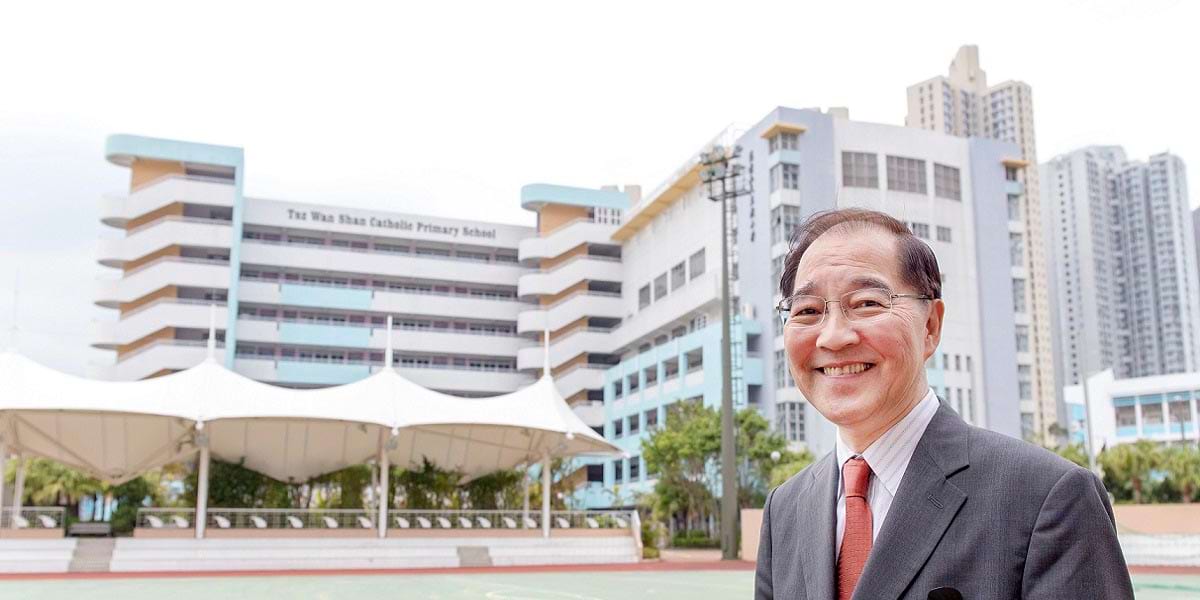Cultivate your kids’ interest in STEM and expand their learning beyond the scope of high-tech science. Have you ever tried building a mini launcher with popsicle sticks, rubber bands, bottle caps and ping pong balls?
Peter Chiu’s tips for primary school admission interviews and choosing the best schools
Do you want your kids to stand out in a primary school admission interview? Experienced education advisor Mr Peter Chiu Wing-Tak shares some useful interview tips below for increasing your child's chance of getting an offer.

One of the things that most Hong Kong parents worry about is picking the right primary schools for their kids, as a wrong decision could potentially jeopardize their bright future. Therefore, to match their kids with the perfect schools, parents strive to equip their kids with the best resources available so they can stand out during the admission interview. But how do you know your preferred school is the right fit for your kids? Mr Peter Chiu Wing Tak, an experienced education advisor and former vice principal of La Salle College, shares some of his tips on primary school enrolment, and looks into the characteristics of the different types of schools.
Learn about the school culture by examining their founding organization
Schools in Hong Kong are run by different supporting groups. Mr Chiu suggests that parents should understand more about the characteristics and cultures of each school by looking into its founding organization. Schools under Hong Kong Sheng Kung Hui (Hong Kong Anglican Church) generally focus more on building students’ values and characters. St. Paul's Co-educational College Primary School is one of the most prominent examples, with its students exuding an aura of class and sophistication. The school also values mutual assistance among students, and appreciates students with a spirit of chivalry.
On the other hand, schools under the Catholic Diocese of Hong Kong usually focus more on students’ moral development and spiritual cultivation; while those under the Catholic Church in Hong Kong place greater emphasis on students’ academic achievement and multiple types of intelligence development. La Salle Primary School, Maryknoll Convent School (Primary Section) and Wah Yan Primary School are typical examples. They all deliver outstanding results during secondary school places allocation.
Resources available in different types of schools
There are four main types of primary schools in Hong Kong: government-aided, direct subsidy scheme (DSS), private schools and international schools. Government-aided primary schools do not charge tuition fees and are directly managed by the Education Bureau. Some of the best known examples include La Salle Primary School and Maryknoll Convent School (Primary Section). These schools allocate their places according to the criteria set by the Education Bureau in several stages including Discretionary Places Admission, Central Allocation and Spare Places. Mr Chiu suggests that parents should apply for at least two DSS/private primary schools as a back up.
There are approximately 70 DSS/private primary schools in Hong Kong. Most of them are “through-train” schools that are paired up with secondary schools, so that students will automatically advance from one to another, helping to relieve the burden borne by parents. However, these schools usually charge tuition fees. Some of the more prestigious schools that fall into this category include Diocesan Girls’ School, Ying Wa Primary School, Diocesan Boys’ School (Primary Division) and St. Paul Co-educational College Primary School. Private primary schools are not fully subsidized or supported by the government, so they have the highest degree of freedom and an abundance of teaching resources.
Tuition fees for international primary schools are generally higher. Some of them even require parents to purchase bonds in exchange for an interview opportunity. Parents should carefully evaluate their own financial abilities before making a decision. Mr Chiu also points out that international schools are not required to follow Hong Kong’s standard education curriculum, so students may find it difficult to bridge the gap between what they’ve learned, and the curriculum taught in other local institutions. Parents should take extra caution if they are planning to send their kids to local secondary schools after graduation.

Three tips for acing the primary one admission interview
Both DSS/private and international schools require each applicant to attend an admission interview. The three golden rules for acing an interview are as follows: 1) answer the questions; 2) never give up, and 3) demonstrate common sense. Beyond all that, students should also be polite and confident when answering the questions. It is more important for parents to teach by words and examples in day-to-day life rather than sending their kids to various kinds of preparation classes.
1. Answer the questions
Most interviews conducted in English revolve around some basic questions that start with “HOW, WHAT, WHEN and WHERE”. Always remember to use full sentences when giving an answer. Parents should help their kids develop a habit of reading English books and make it more interactive by asking questions from time to time. Also, a standard accent is more important than accurate grammar when it comes to acing an interview. Parents should encourage their kids to learn phonics and speak clearly.
2. Never give up
“Never give up” is the mentality many prestigious school's wish to inculcate. Even you don’t know much about a certain topic during an interview, try to answer as well as you can. In one of the cases shared by Mr Chiu, a young boy was asked a series of difficult questions during a group interview. He insisted on trying to answer all of them until the end, while other candidates were giving up one by one. Although none of the answers were right, the boy was finally given an offer. In another interview, a girl was asked, “Do you know how to play the piano?” The girl answered, “I don’t, but I play the violin.” In this way by thinking on her feet, she managed to change the question to her own advantage.
3. Demonstrate common sense
In terms of academic performance, Mr Chiu points out that most schools only look for basic knowledge and common sense, except Diocesan Girls’ School and Diocesan Boys’ School (Primary Division) as they tend to have higher academic requirements than others. Take Ying Wa Primary School as an example: they usually test whether the candidates are able to recognize some high-ranking figures such as Xi Jinping and Carrie Lam. Parents should encourage their kids to read newspapers more often to enrich their knowledge and broaden their horizons.

Elite schools may not always be the best option
There is no such thing as the “best school”, only the school that is best for your kids. Mr Chiu concludes that, as a parent, no one knows your child better than you. You should choose schools that will fit your kids’ character. Elite schools may not always be the best option. Your kids may even lose their passion for learning if they are not placed in schools that really meet their needs.
DSS/private primary schools usually require several rounds of interviews, which is more suitable for kids who are active, energetic and assertive, rather than those who are more introverted and passive. Diocesan Girls’ School and Diocesan Boys’ School (Primary Division) tend to admit students who are smart and motivated, while St. Paul Co-educational College Primary School usually looks for students with a spirit of chivalry.
No matter what type of school you are interested in, parents must always plan well for the future of their children.




